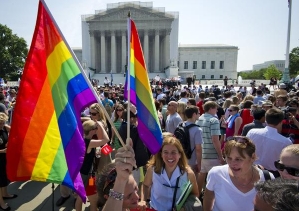
The United States Supreme Court has taken on a case that involves the thorny, divisive issue of same-sex marriage. Both sides of the debate made their arguments in the high court on Tuesday.
According to Richard Wolf and Brad Heath of USA Today, the Supreme Court would finally address the question of whether or not gays and lesbians should be allowed to marry across the United States. However, even this issue has deeply divided the high court itself.
"Same-sex couples say, of course, 'We understand the nobility and the sacredness of the marriage,'" Justice Anthony Kennedy said. "We know we can't procreate, but we want the other attributes of it in order to show that we, too, have a dignity that can be fulfilled."
USA Today reported that Kennedy, who has historically served as a swing vote in the Supreme Court, wrote the court's 2013 decision that allowed legally married gay and lesbian couples to obtain federal benefits. Chief Justice John Roberts, who generally leans conservative, also expressed his thoughts on same-sex couples.
"I'm not sure it's necessary to get into sexual orientation to resolve the case," Roberts said. "I mean, if Sue loves Joe and Tom loves Joe, Sue can marry him and Tom can't. And the difference is based upon their different sex. Why isn't that a straightforward question of sexual discrimination?"
Kennedy then turned his focus on the historical value of marriage. According to USA Today, U.S. Solicitor General Donald Verrilli and Mary Bonauto, a "pioneer" of the same-sex marriage movement, argued that such arrangements should be protected under the Constitution.
"The word that keeps coming back to me in this case is 'millennia,'" Kennedy said. "This definition has been with us for millennia. It's very difficult for the court to say, 'Oh, well, we know better.'"
Roberts seemed to echo Kennedy's sentiment.
"You're not seeking to join the institution," Roberts said. "You're seeking to change what the institution is."
USA Today reported that the conservative members of the Supreme Court expressed concerns about the effects of forcing all states to recognize gay marriages, thus settling the issue once and for all. They wondered if it should be left to the people to vote on the issue or if they should adopt a "wait-and-see" stance on same-sex marriage.
"Closing of debate can close minds, and it will have a consequence on how this new institution is accepted," Roberts said. "People feel very differently about something if they have a chance to vote on it than if it's imposed on them by the courts."
Verrilli argued that the Supreme Court had to make a decision on the constitutionality of same-sex marriages.
"Gay and lesbian people are equal," Verrilli quipped. "They deserve equal protection of the laws, and they deserve it now."
According to USA Today, the liberal members of the Supreme Court attacked the notion that same-sex relationships would harm the relationships of straight couples and lead to more out-of-wedlock children. They also looked at other theoretical limits on who should be allowed to marry.
"Justice Elena Kagan asked if it would be constitutional for states to limit marriage to couples that pledged to have children," Wolf and Heath wrote. "Justice Ruth Bader Ginsburg asked if states could exclude 70-year-olds from marriage because they would not have kids."
USA Today reported that the justices also challenged arguments that the government has an interest in keeping children together with their biological parents.
"How does withholding marriage from one group, same-sex couples, increase the value to the other group?" Justice Sonia Sotomayor asked.
USA Today indicated that Kennedy asked the toughest questions to both sides on the issue of same-sex marriage. This has placed the outcome of the case in doubt.
"[Marriage is] dignity-bestowing, and these parties say they want to have that same ennoblement," Kennedy said.
According to USA Today, the Supreme Court would be ruling on a case that combined six different cases with 32 plaintiffs in four states: Ohio, Michigan, Tennessee and Kentucky. The nation's highest court will issue their decision on the legality of same-sex marriages by late June.






